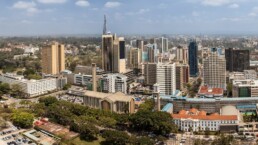Share
Africa as a region faces the highest cost for high-speed internet globally, where, in some countries, 1 GB can cost up to 20% of the average salary. While the lack of competition of telecommunication operators is one of the main factors driving up prices, there is also simply a lack of infrastructure in terms of network capacity and the quality thereof.
With the objective to improve the overall reach and quality of telecommunication networks, private tech giants are heavily investing in terrestrial and subsea fiber-optic networks that shall soon supply the whole continent with high-speed internet. The rapid development of tech infrastructure across the continent, however, overtakes policy-making and raises the concern of African data protection.
With very cost-intensive investments in tech infrastructure, private companies, such as Google or Facebook significantly contribute to developing Africa’s infrastructure to keep up with the rest of the world. At the same time, it secures preferential access to a rapidly growing market for a few companies. Where improved tech infrastructure consequently leads to improved connectivity and economic development on one side, the other side generates profits by feeding its artificial intelligence (AI) products with user data of a market that is only scarcely regulated.
Besides breaking up monopoly structures of telecommunication companies, more investments in tech infrastructure is a key factor to improve access to affordable internet. One example to support this statement might be Google’s Equiano (named after the Nigerian writer and former slave Olaudah Equiano), a network build with Alcatel Submarine Networks that will connect Africa and Europe after its completion in 2021. According to Google, the new network has about 20 times of the capacity, compared to the last cable implemented for the same region. IFC and Google estimate that an increase of 10% of internet penetration might boost the continent’s economy by 2.5%, a goal that can be reached within the next five years, if internet penetration continues to rise at the same speed.
Within the frame of this debate, the term “data colonialism” is a popular buzzword that is often used to describe a newly created social order, based on the permanent collection of data and the exploitation thereof by a few international companies. On the African continent, the exploitation of data plays a critical role, due to a lack of regulation and aligned cross-national tech policies to facilitate the secure and free flow of data between countries. But how should data protection in Africa look like, if citizens are still dependent on external companies? Where does regulation hinder innovation? And can we speak of “colonialization” if African users are the beneficiaries for once?
While the advantages of improved connectivity and quality of broadband are obvious, critics fear that users’ data is exploited by the monopolistic powers of multinational tech giants for the purpose of profit, hence the comparison to traditional colonialism. Big Data is crucial for any AI technologies to learn, therefore any product sold by the respective companies. The data collected and traded by big tech corporations is often referred to as the “new oil”: While unprocessed data does not possess any value alone, value can be created when it is accurately collected and combines with other relevant data to serve as a decision-making tool. Problematic is thereby that data is usually stored in data hubs outside Africa and that most African countries, furthermore, do not have a clear data policy in place to ensure data protection of its citizens.
Demand for local Data Centers
The increasing demand for data storage and the assumption that locally stored data is supposedly more efficiently controlled enforces the urge to build data centers across the continent. A study by IDC confirms that the amount spent on public cloud services in South Africa alone will triple within a timeframe of five years. In 2019, Microsoft had been the first international corporation to open a data center on the continent and has soon been followed by AWS (Amazon), opening its new data center in Cape Town in spring 2020.
But not only international enterprises have understood the investment potential in local data centers. Africa Data Centres by Liquid Telecom have already constructed 9 data centers in 6 African countries and follows a pan-African approach, where African data is stored locally – and also within an African company. This development is a step away from the allegedly data colonialization and towards self-determination. However, for international tech companies to commit to local storage and user determination, an adequate regulatory framework is indispensable.
POPIA – a pioneer in African data protection
In July 2020, South Africa introduced a comprehensive data protection law, “Protection of Personal Information Act” (POPIA), based on the equivalent of the EU’s General Data Protection Regulation (GDPR) and the ePrivacy Directive. It defines eight minimum requirements to process data. While the user’s consent has been introduced as a legal requirement, South African citizens have been empowered with enforceable rights regarding their personal information.
While many African countries will presumable align their data protection laws to the EU’s model, the legislative framework has not yet been harmonized across the continent to allow secured and free data exchange. However, too strict regulations and excessive tax requirements might deter international companies from providing certain services to low-revenue markets altogether, if operating costs are disproportionately high- This poses a significant challenge for policymakers.
Recommendation
To ensure accessible and affordable high-speed internet and IT services for a vast majority of Africans, there is no way around enabling international tech companies to provide large-scale investments in networks and innovation. While investing in Africa’s infrastructure development, African data protection shall be a priority for African policymakers. The general approach to follow would include switching from reactionary politics to pro-active policy-making to frame an environment where innovation is possible, but where its citizens’ data is protected.
The mere prohibition of IT products and services is as problematic as an unrestricted approach, as there are, to date, no African alternatives available. Overly rigid measures and the containment of innovation as a consequence might lead to the withdrawal of significant technology and infrastructure opportunities, which many governments and economies rely on to keep up with the development in the rest of the world.
A second big focus should be set on breaking up monopoly structures of telecommunication companies and the development of local competitors in the sector. Fair rules on the market entry, as well as a greater liberalization of the target markets will help prospective competitors to gain a foothold in the economy.
Time is running to create a clear, realistic, and supra-national digital strategy to prevent data exploitation, enforce data localization, and appropriate international corporations’ taxation.
The views expressed in this article are those of the author and do not necessarily reflect the views of Future Africa Forum. Future Africa Forum is a pan-African policy think-tank and policy advisory consultancy headquartered in Nairobi, Kenya.



